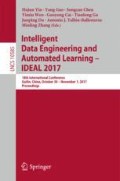Abstract
Existed dengue prediction model associated with temperature data are always based on Poisson regression methods or linear models. However, these models are difficult to be applied to non-stationary climate data, such as rainfall or precipitation. A novel k-nearest neighbor (KNN) regression method was proposed to improve the prediction accuracy of dengue fever regression model in this paper. The dengue cases and the climatic factors (average minimum temperature, average maximum temperature, average temperature, average dew point temperature, temperature difference, relative humidity, absolute humidity, Precipitation) in San Juan, Puerto Rico during the period 1990–2013 were regressed by the KNN algorithm. The performances of KNN regression were studied by compared with correlation analysis and Poisson regression method. Results showed that the KNN model fitted real dengue outbreak better than Poisson regression method while the root mean square error was 6.88.
Access this chapter
Tax calculation will be finalised at checkout
Purchases are for personal use only
References
Bhatt, S., Gething, P.W., Brady, O.J., et al.: The global distribution and burden of dengue. Nature 496(7446), 504–507 (2013)
Gubler, D.J.: Resurgent vector-borne diseases as a global health problem. Emerg. Infect. Dis. 4(3), 442–450 (1998)
Beatty, M.E., Stone, A., Fitzsimons, D.W., et al.: Best practices in dengue surveillance: a report from the Asia-Pacific and Americas Dengue Prevention Boards. PLoS Negl. Trop. Dis. 4(11), e890 (1935)
Guy, B., Saville, M., Lang, J.: Development of sanofi pasteur tetravalent dengue vaccine. Hum. Vaccines 46(9), 696–705 (2009)
Hadinegoro, S.R., Arredondo-García, J.L., Capeding, M.R., et al.: Efficacy and long-term safety of a dengue vaccine in regions of endemic disease. N. Engl. J. Med. 373(13), 1195–1206 (2015)
Villar, L., Dayan, G.H., Arredondogarcía, J.L., et al.: Efficacy of a tetravalent dengue vaccine in children in latin America. N. Engl. J. Med. 372(2), 113–123 (2015)
Banu, S., Hu, W., Hurst, C., et al.: Dengue transmission in the Asia-Pacific region: impact of climate change and socio-environmental factors. Trop. Med. Int. Health 16(5), 598–607 (2011). Tm & Ih
Descloux, E., Mangeas, M., Menkes, C.E., et al.: Climate-based models for understanding and forecasting dengue epidemics. PLoS Negl. Trop. Dis. 6(2), e1470 (2012)
Ferreira, M.C.: Geographical distribution of the association between El Niño South Oscillation and dengue fever in the Americas: a continental analysis using geographical information system-based techniques. Geospatial Health 9(1), 141–151 (2014)
Liao, C.M., Huang, T.L., Lin, Y.J., et al.: Regional response of dengue fever epidemics to interannual variation and related climate variability. Stoch. Env. Res. Risk Assess. 29(3), 947–958 (2015)
Gagnon, A.S., Bush, A., Smoyer-Tomic, K.E.: Dengue epidemics and the El Niño southern oscillation. Clim. Res. 19(1), 35–43 (2001)
Banu, S., Hu, W., Guo, Y., et al.: Projecting the impact of climate change on dengue transmission in Dhaka, Bangladesh. Environ. Int. 63(3), 137–142 (2014)
Focks, D., Alexander, N., Villegas, E.: Multicountry study of Aedes aegypti pupal productivity survey methodology: findings and recommendations. Dengue Bull WHO 31, 192–200 (2007)
Arcari, P., Tapper, N., Pfueller, S.: Regional variability in relationships between climate and dengue/DHF in Indonesia. Singap. J. Trop. Geogr. 28, 251–272 (2007)
Bangs, M., Larasati, R., Corwin, A., et al.: Climatic factors associated with epidemic dengue in Palembang, Indonesia: implications of short-term meteorological events on virus transmission. Southeast Asian J. Trop. Med. Public Health 37, 1103–1116 (2006)
Burattini, M., Chen, M., Chow, A., et al.: Modelling the control strategies against dengue in Singapore. Epidemiol. Infect. 136, 309–319 (2007)
Chowell, G., Sanchez, F.: Climate-based descriptive models of dengue fever: the 2002 epidemic in Colima. Mexico. J Environ. Health 68, 40–44 (2006)
Keating, J.: An investigation into the cyclical incidence of dengue fever. Soc. Sci. Med. 53, 1587–1597 (2001)
Descloux, E., Mangeas, M., Menkes, C.E., et al.: Climate-based models for understanding and forecasting dengue epidemics. PLoS Negl. Trop. Dis. 6, e1470 (2012)
Gharbi, M., Quenel, P., Gustave, J., et al.: Time series analysis of dengue incidence inGuadeloupe, French West Indies: forecasting models using climate variables as predictors. BMC Infect. Dis. 11, 166 (2011)
Goto, K., Kumarendran, B., Mettananda, S., et al.: Analysis of effects of meteorological factors on dengue incidence in Sri Lanka using time series data. PLoS ONE 8, e63717 (2013)
Chen, S.C., Liao, C.M., Chio, C.P., et al.: Lagged temperature effect with mosquito transmission potential explains dengue variability in southern Taiwan: insights from a statistical analysis. Sci. Total Environ. 408, 4069–4075 (2010)
Antoine, A., Pascal, R., Morgan, M., et al.: Predicting dengue fever outbreaks in French guiana using climate indicators. PLoS Negl. Trop. Dis. 10(4), e0004681 (2016)
Barrera, R., Amador, M., Mackay, A.J.: Population dynamics of aedes aegypti and dengue as influenced by weather and human behavior in San Juan, Puerto Rico. PLoS Negl. Trop. Dis. 5(12), e1378 (2011)
Tipayamongkholgul, M., Fang, C.T., Klinchan, S., et al.: Effects of the El Niño-Southern Oscillation on dengue epidemics in Thailand, 1996–2005. BMC Public Health 9(1), 422 (2009)
Earnest, A., Tan, S.B., Wildersmith, A.: Meteorological factors and El Niño southern oscillation are independently associated with dengue infections. Epidemiol. Infect. 140(7), 1244–1251 (2011)
Jiang, Y., Zhu, G.: Prediction of dengue outbreak based on poisson regression and support vector machine. In: The 7th International Symposium on Computational Intelligence and Industrial Applications (ISCIIA2016), FM-GS1-01. Fuji Technology Press, Fuji (2016)
Acknowledgement
This study was supported by Guangxi cloud computing and big data Collaborative Innovation Center (No: YD16E18).
Author information
Authors and Affiliations
Corresponding author
Editor information
Editors and Affiliations
Rights and permissions
Copyright information
© 2017 Springer International Publishing AG
About this paper
Cite this paper
Jiang, Y., Zhu, G., Lin, L. (2017). Research of Dengue Fever Prediction in San Juan, Puerto Rico Based on a KNN Regression Model. In: Yin, H., et al. Intelligent Data Engineering and Automated Learning – IDEAL 2017. IDEAL 2017. Lecture Notes in Computer Science(), vol 10585. Springer, Cham. https://doi.org/10.1007/978-3-319-68935-7_17
Download citation
DOI: https://doi.org/10.1007/978-3-319-68935-7_17
Published:
Publisher Name: Springer, Cham
Print ISBN: 978-3-319-68934-0
Online ISBN: 978-3-319-68935-7
eBook Packages: Computer ScienceComputer Science (R0)

